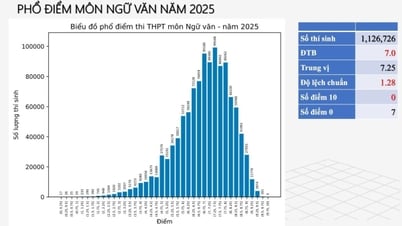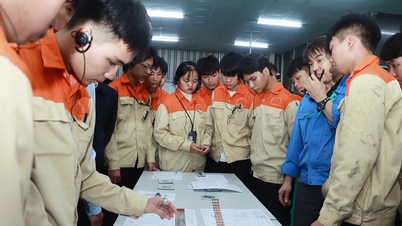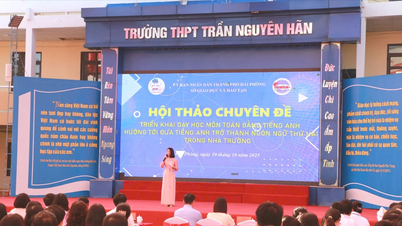Editor's note: Following the significant discrepancies in the distribution of scores across subjects in the high school graduation exam, a proposed solution is to convert scores between subjects. This is causing concern among many students, parents, and experts.
Is a score of 7 in math truly "equal" to a score of 7 in literature or chemistry...? And is it really fair to compare scores between subjects that are fundamentally different?
Dr. Sai Cong Hong, an expert in educational assessment, shares an analytical perspective on this issue.
Please send all comments and suggestions from experts and readers to the email address: giaoduc@dantri.com.vn
Concerns about converting scores for high school graduation exams: A perspective from assessment objectives and the nature of competence.
In recent years, each high school graduation exam has sparked debates surrounding the "score conversion" between subjects.
Many students and parents wonder: if students all get a score of 7, why are some subjects easier and others more difficult? And is it fair to use subject scores to compare and evaluate students' abilities on an equal footing?
From a professional standpoint, the answer is: it is impossible and inadvisable to convert scores between exam subjects. This is not only because the exam questions are different, but also because the nature of the assessment objectives and the specific competency characteristics of each subject are inherently different.

Dr. Sai Cong Hong (Photo: Provided by the interviewee).
An exam serves multiple purposes; a standardized score is impossible.
The current high school graduation exam serves several purposes, two of the most important being: assessing the extent to which students meet the requirements of the 2018 general education curriculum and providing data as a basis for graduation assessment and as a reference for university and college admissions.
Therefore, each test is designed with its own specific purpose, aiming to measure different abilities. When the objectives are not consistent, the test cannot have the same structure, difficulty level, or rating scale. Any conversion of scores between tests thus lacks a scientific basis.
Compulsory subjects, but not necessarily subjects with the same purpose.
Mathematics and Literature are two compulsory subjects in the exam. However, not all candidates take these two subjects with the same goal. Some only need enough points to graduate; others strive to achieve high scores for university admission.
The stratification of objectives means that scores on the same exam can have different meanings. This further demonstrates that even within the same subject, it's impossible to evaluate scores using a single standard, let alone compare scores between different subjects.

Teachers and students of Tay Thanh High School, Ho Chi Minh City, during a lesson (Photo: Huyen Nguyen).
Reasons why it's difficult to convert scores between subjects.
Firstly, there is a difference in assessment objectives: Score conversion is only possible when the exams are designed for the same purpose. When one exam is for graduation assessment and another for university admissions, the nature of the assessment is different, making score exchange impossible.
Secondly, each subject measures a distinct type of competency: Mathematics is about logical thinking and quantitative analysis. Literature is about expression and reasoning. Chemistry is about experimentation and application. English is about language communication… These competencies do not lie on the same spectrum – there is no common measure to convert them.
Thirdly, the exam structure and difficulty level differ: A score of 7 in mathematics might require hours of practice and higher-order thinking skills, while a score of 7 in literature depends on the ability to appreciate and express ideas through language. The same score requires different effort and skills.
Fourth, the score distribution shows a clear disparity between subjects: Analysis of the 2025 score distribution reveals a distinct divergence. Nearly 50% of candidates scored below average in English, while Chemistry had an overwhelming proportion of students achieving good or excellent scores. This reflects not only the difficulty of the exam but also the differentiating nature of each subject – a single "standard score" cannot be used for comparison.

Candidates taking the 2025 high school graduation exam (Photo: Bao Quyen).
Fifth, there is a lack of interdisciplinary standardization tools: In many countries, converting scores between subjects is only possible when there is a standardized competency system – for example, the SAT, ACT exams, or a national competency framework assessment system. Vietnam currently lacks such tools. Therefore, all current conversions are subjective and lack scientific reliability.
Sixth, the consequences of inaccurate conversion: Arbitrary conversion will cause students to choose the wrong combination of subjects for admission, leading to unfairness among candidates. More seriously, it distorts their perception of their own abilities, affecting their future career orientation.
Scores are only meaningful within the context of the subject.
A score only has real value when placed in the correct context: the characteristics of the subject, the exam structure, the national score distribution, and the intended use of the results. You cannot compare a 7 in math with a 7 in literature, nor can you convert a literature score to a chemistry score, or an English score to a history score.
These seemingly reasonable comparisons, if lacking in expertise, can lead to distorted conclusions and negatively impact the students themselves.
In any exam, ensuring fairness is crucial. But fairness doesn't come from "flattening" scores across subjects. Instead, fairness comes from understanding the true nature of assessment for each subject, each exam, and each ability. Therefore, instead of trying to find a common measure for very different subjects, the focus should be on helping students understand their strengths, choose appropriate subject combinations for admission, and place scores in the context where they truly matter.
Dr. Sai Cong Hong
Source: https://dantri.com.vn/giao-duc/ban-khoan-quy-doi-diem-giua-cac-mon-thi-thpt-goc-nhin-tu-chuyen-gia-20250719073728023.htm




![[Photo] Prime Minister Pham Minh Chinh attends the Conference summarizing and implementing tasks of the judicial sector.](/_next/image?url=https%3A%2F%2Fvphoto.vietnam.vn%2Fthumb%2F1200x675%2Fvietnam%2Fresource%2FIMAGE%2F2025%2F12%2F13%2F1765616082148_dsc-5565-jpg.webp&w=3840&q=75)









































































































Comment (0)